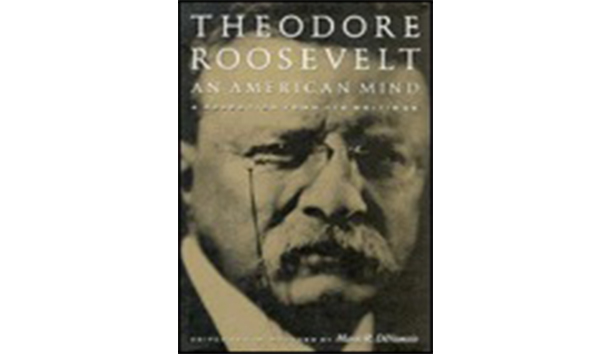While reading this wide-ranging collection, I was struck once again by the similarities between Theodore Roosevelt and Winston Churchill. Both were prolific writers of books and essays that incorporate history and political thought with personal experience. And while the prime motive of both men was to earn extra income, each had an energetic style that continues to bring readers back to their work.
Roosevelt and Churchill owe their reputations not just to the fact that they led their governments in critical times, but to the personal traits that propelled them to high office. Their strong, exuberant characters were formed by remarkably similar experiences. Roosevelt was born in 18S8, 16 years before Churchill. Yet both were baptized by fire in the same conflict, the Cuban revolution against Spain: Churchill, as a newly commissioned cavalry officer, was sent to Cuba in 1895 as an observer, while Roosevelt went to Cuba in 1898 with the 1st Volunteer Cavalry Regiment after resigning his post as Assistant Secretary of the Navy. At about the same time Roosevelt’s “Rough Riders” were charging up the hills outside Santiago, Churchill was in the Sudan making the last great charge of the 21st Lancers at Omdurman. Both men felt the need to test themselves in action, Churchill as a soldier and war correspondent (including time in the trenches during World War II, Roosevelt—whose military experience was limited—as a cowboy and big game hunter. Mario DiNunzio includes substantial passages from Roosevelt’s reminiscences of these years.
Churchill won his first seat in Parliament about the same time Roosevelt was elected Vice President. Both had an abundance of personal ambition, tied firmly to the desire to advance the fortunes of their nations in fulfillment of a duty, as they saw it, owed by virtue of their privileged positions. Neither man was willing to sacrifice his beliefs for mere party conformity or private gain. Churchill is best known as a Conservative, but during the period 1904-1922, he sat across the aisle as a Liberal; Roosevelt split from the Republicans and ran as a third party presidential candidate in 1912. A difference between the two men is the result of the disparate positions of their respective countries along the trajectory of a Great Power. Churchill was trying to maintain the power of the British Empire; Roosevelt to establish an American Empire. Roosevelt’s spirit matched that of a young nation which had just conquered a continent and was looking for new challenges. While Churchill lived to see massive, grinding government oppress his country, Roosevelt knew enough of history and human nature to warn constantly against the danger in his day.
Roosevelt recognized several “types” who might bar the way to American greatness. First was the “peace-at-any-price, universal-arbitration type of being” on the pacifist left whom he regarded as “utterly useless” and whom he battled all his life. Second was the liberal internationalist who hated the military but was forever getting the country embroiled in foreign disputes, usually without any regard for the national interest; Woodrow Wilson was one of Roosevelt’s favorite targets on this score. Third was the Big Businessman who bankrolled his Republican Party. In a reprinted segment of his 1913 autobiography, Roosevelt notes that “our strongest and most capable men had thrown themselves into business. . . . While many of them down at the bottom possessed the fundamental virtues, including the fighting virtues, others were purely of the glorified huckster or pawnbroker type—which when developed to the exclusion of everything else makes about as poor a national type as the world has seen.” This passage foreshadows Joseph Schunipeter’s criticism of bourgeois society made some 30 years later in his classic Capitalism, Socialism and Democracy.
Here is the source of the seeming contradiction of Roosevelt’s career. Recognized as a Progressive for his trust-busting campaign against Big Business and his advocacy of a “square deal” for the working man, in every other area Roosevelt was a staunch conservative. The confusion is caused by the perspective of today, when establishment conservatives have lost their wider social bearings and have become little more than the lapdogs of transnational corporations that the left has always accused them of being. Roosevelt held to a more authentic conservatism, one that embraced society rather than withdrew from it. DiNunzio sees Roosevelt primarily as a conservative, not a category of persons he admires. While conceding Roosevelt’s talent and place in history, he deprecates his “jingoism” and his “less attractive views on race and class.”
Among the 52 entries DiNunzio reprints is an interesting essay from 1917 in which Roosevelt blasts the “feminists” and other “foolish women” of his day, while exalting motherhood. “Woman is society,” says Roosevelt, “she must bear and rear the children as her first duty to the state; and the man’s first duty is to take care of her and the children.” Yet, because he saw the family as an equal commitment and partnership between husband and wife, Roosevelt believed women also deserve the vote, and to participate otherwise in national affairs. He regarded families as the building blocks of the nation, and condemned equally any violation of trust within either institution: “Treason, like adultery, ranks as one of the worst of all possible crimes.”
It is because Theodore Roosevelt thought for himself on the large issues and had the courage to argue strong positions—as well as the talent to do so in stirring fashion—that this collection of his writings is so enjoyable.
[Theodore Roosevelt: An American Mind, by Mario R. DiNunzio (New York: St. Martin’s Press) 359 pp., $24.95]

Leave a Reply